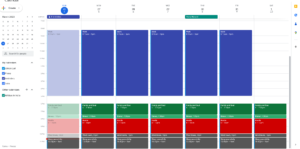This article will help you learn what is toxic productivity, how toxic productivity happens—and how you can avoid the trap of toxic productivity!
Productivity is a hot topic right now, and with good reason. As technology advances and our lives become increasingly busy, we need to find ways to get more done in less time.
We have access to things like Slack and Google Docs that make us more productive than ever before. But there’s a dark side to the efficiency of these tools: They can also be used as weapons of self-destruction by those who are prone to overwork or burnout.
Table of Contents
- Key Takeaways
- What is toxic productivity?
- The Trap of toxic productivity
- Signs of toxic productivity
- How to avoid toxic productivity
- Call to action
- Conclusion
- Frequently Asked Questions on the Trap of Toxic Productivity
Key Takeaways
- Toxic productivity is when you work too much and feel tired and stressed.
- Signs of toxic productivity include feeling like you never have enough time, not taking breaks, and feeling guilty for resting.
- Take care of yourself to avoid toxic productivity and burnout.
- Burnout is when you feel really exhausted and stressed from working too much.
- Burnout can make you feel sick, hurt your relationships, and your work.
- Take care of yourself by exercising, spending time with loved ones, and getting enough sleep to avoid burnout.
- Taking breaks during the workday is important for avoiding burnout and staying productive.
- Recognize the signs of burnout early and take care of yourself to avoid long-term negative effects.
What is toxic productivity?
Toxic productivity is a term used to describe the work culture that we have today. It’s characterized by a lack of balance between work and life and a focus on quantity over quality. Toxic productivity is not a sustainable way to live; it leads to burnout, stress, and anxiety.
The good news is that there are ways to break out of this trap–but first, you need to understand what got you there in the first place!
What causes toxic productivity? The answer is simple: it’s easy to get caught in the trap of toxic productivity.
It starts with a bad habit, like putting work before your own health or that of your family.
Once you begin down this path, it becomes increasingly difficult to turn back. You start out working extra hours and sacrificing time with friends or loved ones in order to “get ahead”.
Then, when you come up against a challenge at work, you find yourself feeling anxious and stressed out–and this sense of pressure leads you to take on even more tasks.
The Trap of toxic productivity
Toxic productivity is a form of self-sabotage. It’s a way of avoiding real problems, and it can lead to burnout.
Toxic productivity is also a way of avoiding introspection and self-discovery, which are key components in becoming more productive and successful as an individual.
If you’re not careful, toxic productivity can become a habit. It’s easy to fall into the trap of doing more and more without thinking about what it is that you’re doing and why.

Signs of toxic productivity
Toxic productivity is the result of an unhealthy relationship with your work. It can take many forms, but you’ll know it when you see it:
- Rushing through tasks
- Ignoring your health
- Forgetting to eat or drink water (or both) during long stretches of time at the office
- Working late into the night because there’s always more work to do and never enough time in the day
It’s easy to get caught up in this cycle when we’re stressed out about deadlines or feeling pressure from others around us.
But what if we didn’t have to rush through our tasks?
What if we could take breaks every hour or two instead of working until midnight?
And what about eating lunch–shouldn’t that be a priority too?
How to avoid toxic productivity
- Take a break.
- Do something you enjoy.
- Get enough sleep, even if that means going to bed earlier than usual.
- Make time for family and friends–not just on weekends but every day of the week! If someone’s important enough to be in your life, then he or she should be allowed into it as much as possible without having to fight through your schedule first (unless it’s urgent).
- Take up a hobby, such as yoga or meditation, that relaxes you and provides time to unwind.
Call to action
The best way to avoid burnout is to be proactive. Here are some tips:
- Take a break. It’s important to give yourself time off from work so that your mind and body can recharge, which will help prevent burnout in the long run.
- Sleep more–at least eight hours per night (more if possible). This will help keep your energy levels high throughout the day and prevent fatigue-related problems like headaches or lack of focus on tasks at hand.
- Eat well–a balanced diet with plenty of fruits, vegetables, and whole grains will keep your body running smoothly with enough nutrients for optimal performance throughout each day’s activities; plus it tastes great!
- Exercise regularly so that all those endorphins released from exercise keep bringing happiness into our lives while also boosting our moods while they’re at it! They also reduce stress levels by releasing tension from muscles that have been held tight due to stressors over time…so go ahead – take advantage of this natural high throughout each day by getting moving now!
- Time Blocking–If you are like most people, finding time to do all the things on your to-do list is a challenge. One way to increase productivity and reduce stress is by using time blocking.
Conclusion
Productivity is a good thing, but it can become toxic if taken too far. It’s important to keep in mind that you don’t have to be the most productive person in your office or on your team–and if you feel pressured by others’ expectations, then it’s time to take a step back and reevaluate how much stress is worth taking on.
Frequently Asked Questions on the Trap of Toxic Productivity
Here are some frequently asked questions (FAQs) and answers related to the topic of toxic productivity and avoiding burnout:
What is toxic productivity?
Toxic productivity is the mindset of constantly feeling the need to be productive, even to the point of sacrificing personal well-being and rest. It can lead to burnout, which is a state of emotional, physical, and mental exhaustion caused by excessive and prolonged stress.
How can I tell if my productivity is becoming toxic?
Common signs of toxic productivity include feeling overwhelmed, constantly pushing yourself to do more, sacrificing personal time and rest, and feeling guilty when you’re not being productive. If you’re experiencing these symptoms, it’s important to take a step back and prioritize self-care.
How can I avoid toxic productivity?
Strategies for avoiding toxic productivity include setting realistic goals, prioritizing self-care, learning to say no, and practicing mindfulness and meditation. It’s also important to create healthy boundaries between work and personal life and to avoid over-committing yourself.
What are the negative effects of burnout?
Burnout can lead to a variety of negative effects, including physical symptoms such as headaches, fatigue, and insomnia. It can also cause emotional symptoms like depression, anxiety, and irritability. Burnout can also negatively impact relationships and job performance, leading to decreased productivity and effectiveness in the long run.
How can I prioritize self-care to avoid burnout?
Prioritizing self-care involves taking time for yourself to engage in activities that promote relaxation and well-being. This can include things like exercise, spending time with loved ones, practicing mindfulness and meditation, and getting enough sleep. It’s important to create a self-care routine that works for you and to stick to it consistently.
Is it okay to take breaks during the workday?
Yes, taking breaks during the workday is important for avoiding burnout and maintaining productivity. Taking short breaks to stretch, walk, or simply rest can help improve focus and concentration when you return to work. It’s important to give yourself permission to take breaks and prioritize your well-being, even when you’re busy.



